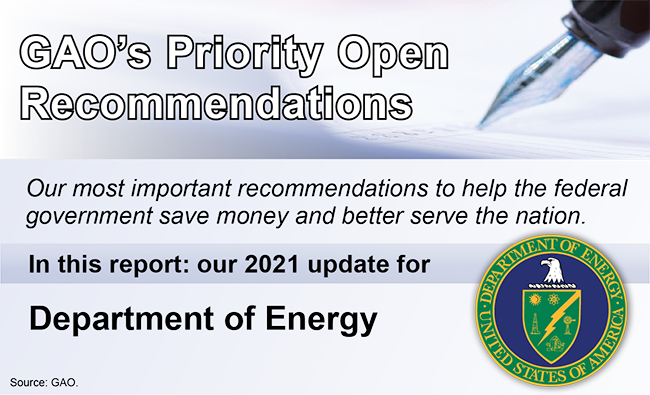Priority Open Recommendations: Department of Energy
Fast Facts
Each year, we make more than 1,000 recommendations to help improve the federal government. We alert department heads to where they can save the most money, address issues on our High Risk List, or significantly improve government operations.
This report outlines our 25 priority open recommendations for Department of Energy as of June 2021.
For example, we recommended that DOE implement a strategy that defines goals and measures progress in making the electricity grid more resilient to climate change risks.
Since our previous letter in April 2020, DOE implemented 4 of our priority recommendations.

Highlights
What GAO Found
In April 2020, GAO identified 20 priority recommendations for the Department of Energy (DOE). Since then, DOE and the National Nuclear Security Administration (NNSA) have implemented four of those recommendations by, among other things, taking actions to better ensure subcontract audits are conducted so that DOE may be able to recover unallowable costs within the Contract Disputes Act 6-year limitation period.
In June 2021, GAO identified nine additional priority recommendations for DOE, bringing the total number to 25. These recommendations address the following areas:
- project and program management.
- contract management.
- financial and cost information.
- planning for the future of the Strategic Petroleum Reserve.
- nuclear modernization challenges.
- DOE's environmental liability.
- cybersecurity.
- worker protections.
- electricity grid resilience.
DOE's continued attention to these issues could lead to significant improvements in government operations.
Why GAO Did This Study
Priority open recommendations are the GAO recommendations that warrant priority attention from heads of key departments or agencies because their implementation could save large amounts of money; improve congressional and/or executive branch decision-making on major issues; eliminate mismanagement, fraud, and abuse; or ensure that programs comply with laws and funds are legally spent, among other benefits. Since 2015, GAO has sent letters to selected agencies to highlight the importance of implementing such recommendations.
For more information, contact Mark Gaffigan at (202) 512-3841 or gaffiganm@gao.gov.
